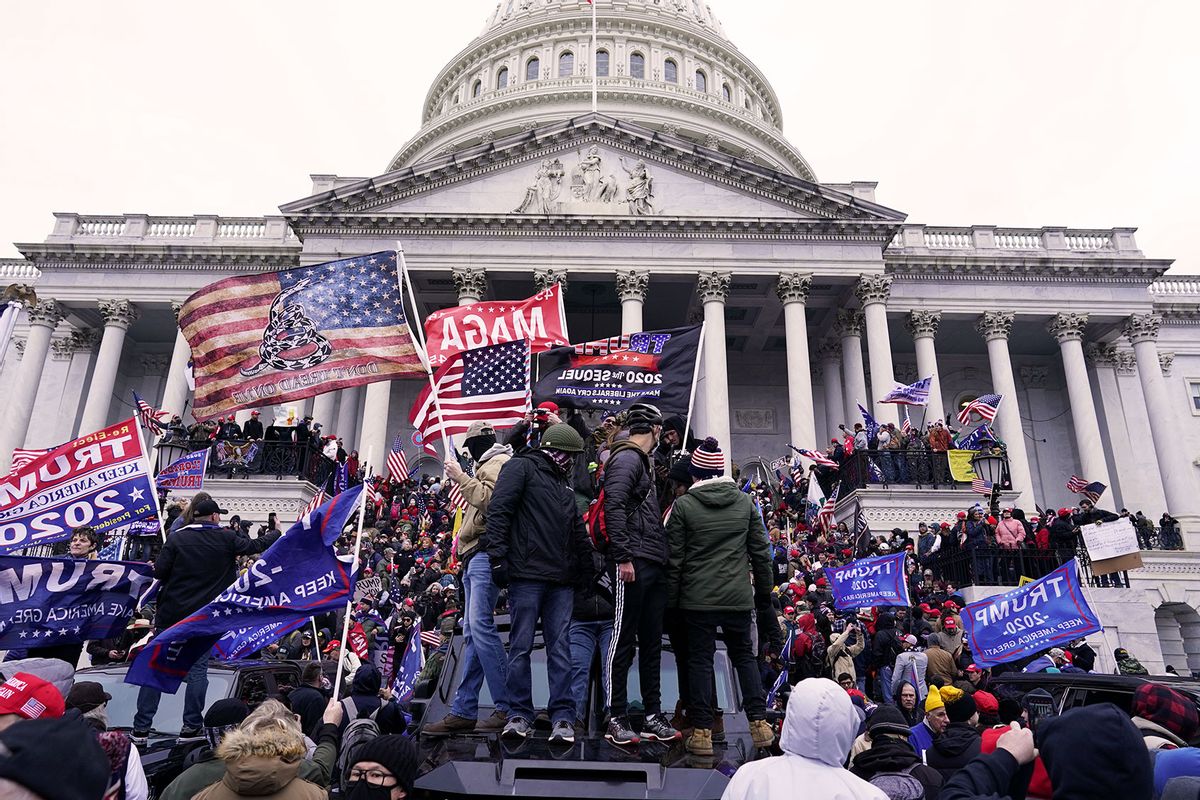Jan. 6 hearings: Collective therapy with no catharsis — and probably no convictions

During its second televised hearing on Monday, the House Jan. 6 select committee continued to pummel Donald Trump, his coup cabal and the Big Lie with facts. If these hearings were a boxing match, the referee would have stopped the fight already to prevent a permanent if not lethal injury.
In its first hearing last Thursday, the committee clearly established that Trump and his cabal attempted a coup aimed at nullifying the 2020 presidential election and, in effect, ending American democracy. The conspiracy was complex and nationwide in scale. It involved legal and quasi-legal maneuvers as well as a violent insurrection. It came close to succeeding. In total, Trump and his cabal committed unprecedented crimes against the United States, which have imperiled the future of the country.
In Monday’s hearing, the committee presented evidence that Trump was repeatedly told by his political and legal advisers that he had lost the election to Joe Biden, yet he continued to lie to the American people — and most importantly his political cult members — by claiming the election had been rigged or stolen and the results were illegitimate. Trump used the Big Lie to raise hundreds of millions of dollars from his followers — most of which was diverted to Trump’s political and business operations — and as the pretext for his coup attempt.
RELATED: Jan. 6 committee makes the case clear for Merrick Garland: Failure to prosecute Trump is political
Legal experts have described these actions as constituting criminal fraud and conspiracy, with malice aforethought. At Rolling Stone, Ryan Bort reports that Trump’s “Official Election Defense Fund,” which apparently never existed, raised $250 million,
most of which did not go to election litigation, but to Trump’s newly created Save America PAC. The PAC then made contributions to Mark Meadows’ charity, to a conservative organization employing former Trump staffers, to the Trump Hotel Collection, and to the company that organized the rally that preceded the attack on the Capitol last Jan. 6.
“The evidence developed by the select committee highlights how the Trump campaign aggressively pushed false election claims to fundraise, telling supporters it would be used to fight voter fraud that did not exist,” said Amanda Wick, a lawyer for the Jan. 6 committee. “The emails continued through Jan. 6, even as Trump spoke on the Ellipse. Thirty minutes after the last fundraising email was sent, the Capitol was breached.”
In my recent interview with criminologist Gregg Barak, he offered this profile of Donald Trump:
Trump has no principles or ethics that he truly subscribes to. The only thing that matters to Trump is the accumulation of power and glorification.
Trump’s basic con is that he’s going to bring something to people who feel aggrieved or that they need something. That he is fighting on their behalf. But again, it’s not even that Trump doesn’t deliver what he promises. Those people are not even really being conned: They know that Trump is a con artist. But they admire the fact that Trump can push back, that he can thumb his nose at the law and rules and norms, that he can abuse the law — and everyone else, for that matter — and get away with it. A big part of why Trump’s followers are captivated by him is because he’s basically saying “fuck you” to everyone and getting away with it. Donald Trump is a type of outlaw.
The Jan. 6 committee’s public hearings would seem to support Barak’s conclusions, and are clearly intended to provide evidence that could lead to Trump’s prosecution and conviction. To this point, Attorney General Merrick Garland and the Department of Justice have given no indication that is likely.
But these hearings are much more than an attempt to provide a thorough accounting of the crimes of that day and the Trump movement’s threats against American democracy. They also serve as a type of public teaching on the importance of shared understandings of truth and reality in a democracy.
In his book “On Tyranny,” Timothy Snyder writes: “Believe in truth. To abandon facts is to abandon freedom. If nothing is true, then no one can criticize power, because there is no basis upon which to do so. If nothing is true, then all is spectacle. The biggest wallet pays for the most blinding lights.”
Want a daily wrap-up of all the news and commentary Salon has to offer? Subscribe to our morning newsletter, Crash Course.
For many Americans, the Jan. 6 committee’s hearings are also a type of collective national therapy session — especially for those who have been most alert to the dangers of the Trump movement. Many of those voices were marginalized or ignored by the mainstream media, political elites and other gatekeepers who continued to insist that Trump might “pivot” and become more “normal” and “presidential” in his conduct. Those same gatekeepers tended to dismiss warnings about rising American fascism and right-wing political violence as being hysterical or hyperbolic signs of “Trump derangement syndrome.” The institutions of democracy were strong, we were told; America is an “exceptional nation.”
Even after the events of Jan. 6, many of these same political elites tried to minimize the events of that day as proof that somehow America’s constitutional order was in fact “strong” because the coup did not succeed. Furthermore, the coup attempt was not “serious” but the actions of a spontaneous “mob.” Members of Congress were not in “real danger” and the transfer of power was not in jeopardy.
As public evidence continues to affirm how serious Trump’s coup attempt actually was, many of those gatekeepers are now literally rewriting history in real time to make themselves look like stalwart guardians of democracy rather than de facto collaborators or enablers of Trumpism.
This collective therapy session may be exhilarating, but also frustrating. We must approach it with limited expectations of what it can actually deliver.
In short, the Jan. 6 committee hearings stand as confirmation that those of us who sounded the alarm early and often about America’s democracy crisis and the dangers of the Age of Trump were not delusional. We chose to see reality for what it was, rather than continue to believe in a fantasy colored by privilege and emotional or material investments in a dying political order.
But we must approach this collective national therapy session with great caution and measured expectations. As new information is revealed and many of our suspicions are confirmed by the committee hearings, there will be a temptation to feel relief and exhalation — and also to feel considerable anger and frustration.
These hearings will not offer anything close to a real catharsis for those who are fighting to defend American democracy against Trumpism and the Republican-fascist movement. American society is too divided and the rot is too deep to be cleansed by a few weeks of public hearings, no matter what “revelations” they may offer.
Psychologist Erich Fromm said this about the process of catharsis:
Real conflicts between two people, those which do not serve to cover up or to project, but which are experienced on the deep level of inner reality to which they belong, are not destructive. They lead to clarification, they produce a catharsis from which both persons emerge with more knowledge and more strength.
We are not likely to experience such a thing in America in 2022. In fact, the Jan. 6 committee hearings will likely change very little about the country’s overall political dynamics and democracy crisis. Expecting the hearings to bring justice is unrealistic. Considered as therapy, these hearings are more likely to bring disappointment than some type of healing and closure.
Last Thursday, CNN’s Stephen Collinson echoed these concerns, noting that what happened on Jan. 6, 2021, is already familiar to most Americans, at least in general terms:
That represents a challenge to the panel in creating a new understanding of the outrage since almost every potential viewer saw Trump trash the election for weeks and watched on television as his supporters marauded through Congress when it was certifying Biden’s 2020 win.
Many Americans are now more preoccupied with current crises, including record gasoline prices, a soaring cost of living and a pandemic that never seems to end, so the chances of the hearings stirring a new political awakening seem low. And many voters long ago made up their minds about Trump, an extremely polarizing figure who draws revulsion but also great partisan loyalty.
Furthermore, Collinson notes, the “powerful conservative news machine” embodied by Fox News will largely ignore the hearings, and the country’s “deeply politicized mood” means that the committee’s findings will inevitably “be viewed through a partisan lens”:
A poll in April from the Washington Post and ABC News found that 40% of Americans believed the committee was conducting a fair and impartial investigation while 40% disagreed. In a CBS/YouGov poll in May, 89% of Democrats said it was at least somewhat important to find out what happened on January 6, 2021, while only 48% of Republicans believed so.
That “national fracturing,” Collinson concludes, makes it virtually impossible for these hearings to have “the same effect the Watergate television blockbusters had in 1973,” which was ultimately to bring down Richard Nixon’s presidency.
Ultimately, American society is divided between those who live in empirical reality and those who have chosen by the millions to live in the upside-down universe of TrumpWorld. There are few if any facts that could persuade those people to return to normal society. If anything, learning the truth about Donald Trump’s criminal regime will, in all likelihood, only intensify the loyalty of his followers.
The American people are still at the beginning of what may be a decades-long battle against Trumpism and the Republican-fascist movement. This series of public hearings on the crimes of Jan. 6, 2021, will be over before the end of June. (There may be further hearings this fall.) Fascist movements tend to break time and reality. Whatever “revelations” emerge from these hearings will likely disappear down the memory hole, especially in a traumatized nation whose people seem to have difficulty remembering last Tuesday.
What then? What are we to do, those of us who see the fascist nightmare clearly and the doom that is already here and getting worse?
We must fight like our lives and democracy depend on it — because they do — even if too many of our fellow Americans are already exhausted and in a state of learned helplessness before the battle has even been fully joined. There is no other option in this struggle to save American democracy — and ourselves — from the fascist tide.
Read more on the Jan. 6 committee hearings:


